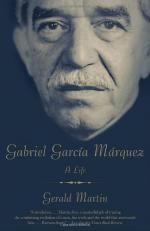|
This section contains 6,368 words (approx. 22 pages at 300 words per page) |

|
SOURCE: Moraña, Mabel. “Modernity and Marginality in Love in the Time of Cholera.” Studies in Twentieth Century Literature 14, no. 1 (winter 1990): 27-43.
In the following essay, Moraña provides a thematic and stylistic analysis of Love in the Time of Cholera.
The brilliant and complex prose of Gabriel García Márquez has still not been sufficiently analyzed for its ideological implications. His “paper human beings” (to use Roland Barthes's term for literature's men and women) both evokes and surpasses other prototypical literary representations as well as the actual protagonists of Latin American history. His patriarchs and matriarchs, his colonels, the lyricism and solitude of his lonely characters, his legendary and magical families, tenuously evoke known reality. At the same time, it is obvious that they are not susceptible to a literal reading. They victoriously transcend mere referentiality and at times appear to be figments of poetic license...
|
This section contains 6,368 words (approx. 22 pages at 300 words per page) |

|


